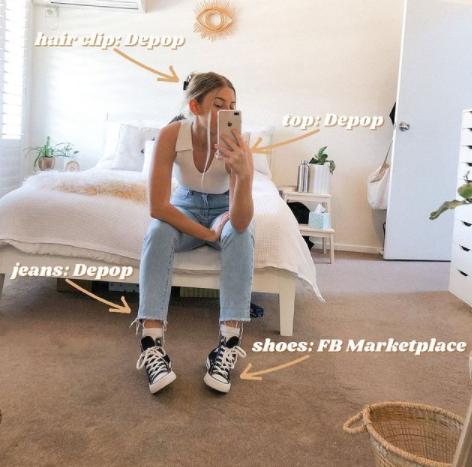PT2 of sustainable living w ERIN SKINNER

PART TWO of sustainability school with the best, Erin Skinner!!
This week we spill the tea on what YOU can do to make the earth breathe easy without breaking the bank + more reason why you should start living a more conscious life.
Enjoy xx
Our generation x hyper fast fashion
The last 20+ years have seen a number of changes to the global socio-political landscape that have propelled the fast fashion industry to where it is today. Changes in technology, globalisation, trade policies, disposable income, and of course: the internet and social media. Most of us under 30 were born into this system of cheap, ephemeral, fashion; we quite literally don’t know any different. Perhaps our parents, more likely their parents, and definitely their parents, would remember a time where you saved up your money to afford one high quality garment that would last for many years. Today we have TikTok teens telling us our House of Sunny cardigan from a month ago is ‘cheugy’, while spruiking their $200 SHEIN haul. The rapid rise of social media and influencers has had an undoubted impact on Gen Z’s fashion consumption behaviours, but on the flip side, young people are also the most vocal about the need for sustainability.

How to dispose of old clothes in a sustainable way?
There are a few ways to do this depending on the condition of the garment. If you have the time and energy, try reselling your used (but in good condition) clothing using a secondhand retailer like Depop, eBay, or Facebook Marketplace. This helps to prevent the dumping of unsold charity shop clothes into the Global South, and you pocket the cash! You can donate to secondhand or charity shops, like Savers, Vinnies, etc - or you can seek out organisations collecting clothing for First Nations and refugee communities-in-need. If your clothing is not in good condition, please don’t donate it. A good metric is: if you wouldn’t buy it, don’t donate it. Instead, cut up to use as cleaning cloths, or send a bag to Upparel for recycling. H&M accept clothing in-store for textile recycling, just make sure to say ‘no thanks’ to the voucher offered in return!

Where do I start?
Trying to be more sustainable with your fashion can be super daunting. It’s best to start slow to prevent being overwhelmed and burning out. I would start with some education sources, such as Ted Ed’s Lifecycle of a T shirt , or The True Cost documentary. Unfollow influencers who make you feel like you need to keep buying stuff to be happy. Do a wardrobe audit; how many items do you have? What can you see yourself wearing for the next 2 years? 5 years? 10? Think back to your past fashion choices… what would you wear again now? What wouldn’t you? Ask your friends to describe your style? These are all important steps in figuring out your personal style, and getting on the way to a more conscious wardrobe. Download the Good On You app, and before you make a purchase, check the brand’s rating and see if there are any better alternatives.
Ditching fast fashion without going broke
The most important part of slow fashion, especially for young people who often have a lower income, is less about where and more about how. Buy from H&M if you have to, but choose an item that you can see yourself wearing for years and years instead of for one event. Borrow from friends. Attend a clothes swap event. Unfollow influencers who make you feel inadequate. Understand your individual fashion taste. Learn to sew. Unsubscribe from fast fashion emails. Be mindful. Buy less, choose well, make it last – Vivienne Westwood. Slowing down your consumption costs nothing!

Eco guilt? What is it, how to reduce it?
Whether it’s from driving when you could’ve used public transport or not being able to resist a coffee in a disposable cup at 3pm on a Friday, it’s likely if you care about the environment you’ve experienced eco guilt. Eco guilt is the sense of personal shame and/or responsibility when you act in a way that doesn’t align with you or society’s standards for environmentally-friendly behaviour. While eco guilt is pretty normal for those of us in the eco-sphere, it shouldn’t be! While yes, there are almost 8 billion of us, you are still an individual just out here trying the best you can in a system designed to work this way. It is hard to reduce plastic, and quit fast fashion, and avoid travel, and LIVE ‘SUSTAINABLY’, because the society we live in does not prioritise these things. It’s okay to step back a bit and admit that it’s hard and you aren’t perfect. I know as soon as I did my mental health was better for it and I had a much clearer, bigger picture, which then enabled me to look at the much deeper issues like governments and companies (who at this point are super duper responsible). My area of research is consumer-driven, so I will always value these changes, BUT it’s important we don’t let eco guilt paralyse us into inaction and instead take time to recalibrate and recharge to come back better and stronger.


This is awesome and so pertinent. Wonderful to see the younger generation taking this on, it is soooo needed.